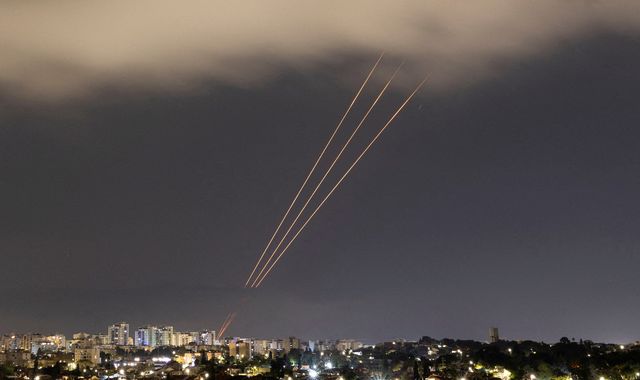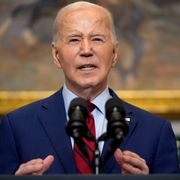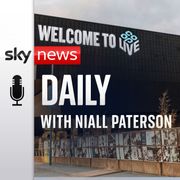Key moments in the Middle East this week - from Iran's attack on Israel to the apparent retaliation
19 April 2024, 09:54 | Updated: 19 April 2024, 14:50

Israel has launched an attack against Iran in retaliation to a drone and missile strike launched against it on Saturday.
The IDF has declined to comment on the retaliatory strike, but a source told Sky News's US partner network NBC News that Israel carried out an operation last night.
Iranian state media has said the country's defence system was fired and three drones were shot down over the central city of Isfahan - home to a nuclear site and a military airbase.
The country has said it has no plans for immediate retaliation and sought to downplay the military activity. A senior official said the country was looking at it more as an "infiltration" rather than an "external attack".
Middle East latest - follow live
With tensions continuing to rise in the Middle East, we look at some of the key moments in the region this week - from the initial attack by Iran, to Israel and its allies' rhetoric before the retaliation.
Iran launches attack
185 explosive drones and 110 ballistic missiles were launched at Israel by Iran last weekend.
IDF Rear Admiral Daniel Hagari said "only a few" entered Israel and "99%" were intercepted by its defence system.
Some 30 cruise missiles were launched, 25 of which were intercepted outside Israel's borders, according to the IDF.
"Dozens of rockets" were then launched from Lebanon, striking the Nevatim Air Base, where there was only "minor damage caused to the infrastructure," Mr Hagari said.
There were no reported fatalities, but a seven-year-old girl "was severely injured by shrapnel," he said.
The IDF said Israeli forces had "successfully intercepted" the majority of the launches with its air defence system - as well as with help from its strategic allies - before the drones and missiles reached Israel.
It was an attack Iran had repeatedly threatened to carry out since 1 April, when two generals and seven members of Iran's Islamic Revolutionary Guard Corps (IRGC) were killed in a strike which Tehran blamed on Israel.
Israel declined to comment on whether they carried out the strike.
Western allies called for Israeli restraint
The UK and US helped Israel down Iran's missiles and drones alongside France and Jordan - and their leaders immediately urged Israel not to retaliate.
Rishi Sunak condemned Iran's attack in parliament on Monday, adding: "We're working urgently with our allies to de-escalate the situation and prevent further bloodshed. We want to see calmer heads prevail, and we're directing all our diplomatic efforts to that end."
US President Joe Biden made similar remarks, telling Israeli Prime Minister Benjamin Netanyahu to "take the win" rather than hit back at Iran.
Read more:
Is it safe to travel to holiday destinations as tension escalates?
Why Israel's attack on Iran reflects badly on Biden
According to US administration officials, Mr Biden reaffirmed support for the defence of Israel in a call with Mr Netanyahu shortly after Iran's attack and told him Israel had "come out far ahead" and had "demonstrated military superiority".
But Israel's military chief Lt Gen Herzi Halevi promised a response and, after meeting UK Foreign Secretary Lord Cameron later in the week, Mr Netanyahu said Israel would "make our own decisions" on Iran, Hamas and Hezbollah.
While he thanked "our friends for their support in defending Israel," he added: "I appreciate it, but I want to make clear that we will make our own decisions and the state of Israel will do all that is needed to defend itself."
Israel responds
Israel launched its own strike on Friday morning, with Iran's state media saying air defences were fired in several provinces, including from a major military airbase and nuclear facilities near the central city of Isfahan, where state media said three drones had been shot down.
So far there have not been any reports of damage or casualties in what our experts have described as a "limited strike".
Israel has declined to comment, but a US source familiar with the situation has described the operation as a strike.
Sky News' military analyst Michael Clarke says Isfahan, which is home to both a military base and nuclear site, "would make sense" as a target because it is an "important" area, used by Iran as a nuclear research site.
"The fact that Isfahan is one of the cities that does quite a lot of nuclear work is also symbolically quite important, I think, if the Israelis are indicating that they're not frightened to go after these sites," he said.
Iranian state media television said the nuclear facilities near the city were "fully safe".
The UN's nuclear watchdog, the International Atomic Energy Agency, also said there was no damage but that it was monitoring the situation "very closely" and called for "extreme restraint".
A senior Iranian official has told Reuters the country has no plans to immediately retaliate.
Also this week: US vetos Palestinian bid for full UN membership
On Thursday, the US blocked a Palestinian bid to be recognised as a full member state at the United Nations.
Twelve of the 15-member Security Council were in favour, but the US vetoed the motion, saying that while it still strongly supported a two-state solution, its vote was "acknowledgment that it will only come from direct negotiations between the parties". Britain and Switzerland abstained.
America's UN envoy Robert Wood cited Hamas's continued control over Gaza as a key factor in blocking the motion.
The Palestinian Authority, based in the West Bank, is currently a non-member observer state at the UN - a position granted in 2012.
Its bid for full membership must be passed by the Security Council and at least two-thirds of the General Assembly.
Palestinians want a state in the West Bank, east Jerusalem and Gaza Strip; all territory taken by Israel in 1967.
The UN has long advocated for a plan that would see a Palestinian state with secure and agreed borders created next to Israel.
Many see it as the best chance to end the decades of violence that preceded the current Israel-Hamas war.
However, hardliners in Israel's right-wing government reject the idea of a Palestinian state.
(c) Sky News 2024: Key moments in the Middle East this week - from Iran's attack on Israel to the apparent retaliation






